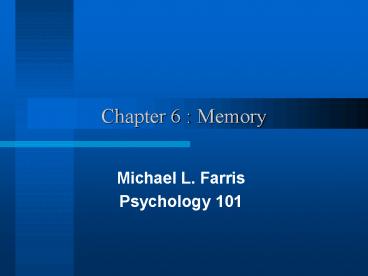Chapter 6 : Memory PowerPoint PPT Presentation
Title: Chapter 6 : Memory
1
Chapter 6 Memory
- Michael L. Farris
- Psychology 101
2
Memory
- Short Term Memory Temporary Storage of
Information (P.196-197). The memory subsystem
that allows for retention and processing of newly
acquired information for a maximum of about
thirty seconds (also called working memory). - Digit Span Test How many numbers can the average
person remember at one time? - Chunking (Re-Coding) The process of enhancing
retention of a large amount of information by
breaking it down into smaller, more easily
recalled chunks. Grouping numbers or other data
together to make them easier to recall (think of
a telephone number) P.197.
3
Memory Strategies
- Rehearsal-silently repeating a short term memory
until it is needed, or until it enters long term
memory for more permanent storage. - Recall, Recognition, and Relearning 3 commonly
used memory tasks (tests of memory). Recognition
(p.211) is usually superior to recall. (Please
see pages 197-199 in your text for details)
4
Memory Errors
- Serial Position Effect The greatest number of
errors is found for middle items of an ordered
list. (Please see page 208 in your text for
details) - Distractors (false items included with an item to
be recognized) and False Positives (a false sense
of recognition). (Please see Coon page 312 for
details)
5
Relearning and Forgetting
- Relearning-Learning again something that was
previously learned. This results in quicker
learning the second time. (Please see Coon page
313 for details.) - Why we forget Encoding Failure (p.209) , Decay,
Cue-Dependent Learning, State-Dependent Learning.
(Please see Coon, pages 318-319 for details.)
6
Why We Forget
- Encoding Failure Memories cannot be retrieved if
they were never encoded (stored in long term
memory) in the first place. - Events that stand out tend to be better
remembered. You are more likely to remember your
first date than your twenty-third one. - Does anyone remember what image appears on the
back of a nickel? - We tend to encode only as much information as we
need to know. Since we dont need to encode more
specific details of a coin to recognize one or
use it correctly, such information may not be
encoded and thus cannot be retrieved. Nevid,
P.219.
7
Cue Dependent/State Dependent Learning
- Cue Dependent Learning (Coon, Pgs. 318-319) A
technique of memory enhancement involving the
assignment of specific data to cues found in the
environment. For example, assigning the name of
a president to a clock on the wall when you look
at the clock, it helps jog your memory. - State Dependent Learning (Coon, pgs. 318-319)
Putting your body in the same physical state it
was in when you were learning the information you
are attempting to recall. If you drink Coke
while you study, try to drink it again when you
take the quiz. It helps to be in the same
physical and mental state you were in when you
absorbed the information.
8
Memory Loss
- Repression (involuntary) versus Suppression
(voluntary) of memories (Please see page 210
(Nevid) and 322 (Coon). - Freud believed that certain memories are not
forgotten but are kept hidden from awareness by
repression, or motivated forgetting. - In Freuds view, repression is a psychological
defense mechanism that protects the self from
awareness of threatening material. - Amnesia-Retrograde (forgetting past events) and
Anterograde (people cannot form or store new
memories or have difficulty doing so). (Please
see pages 211-212 in your text for details)
9
Ways to Improve Memory
- Recitation (Repeating information verbally until
it is encoded into long term memory) - Rehearsal (Silently repeating information until
it is encoded into long term memory) - Selection (Highlighting important information
instead of reading an entire page) - Organization (chunking) (Separating information
into smaller chunks of information to remember) - Spaced practice (Studying a small amount of
information for a short time, then taking a break
before studying more) - Mnemonic-any kind of memory system or aid.
(Please see page 217 in your text for details) - (Please see Coon pages 326-332 for details)

